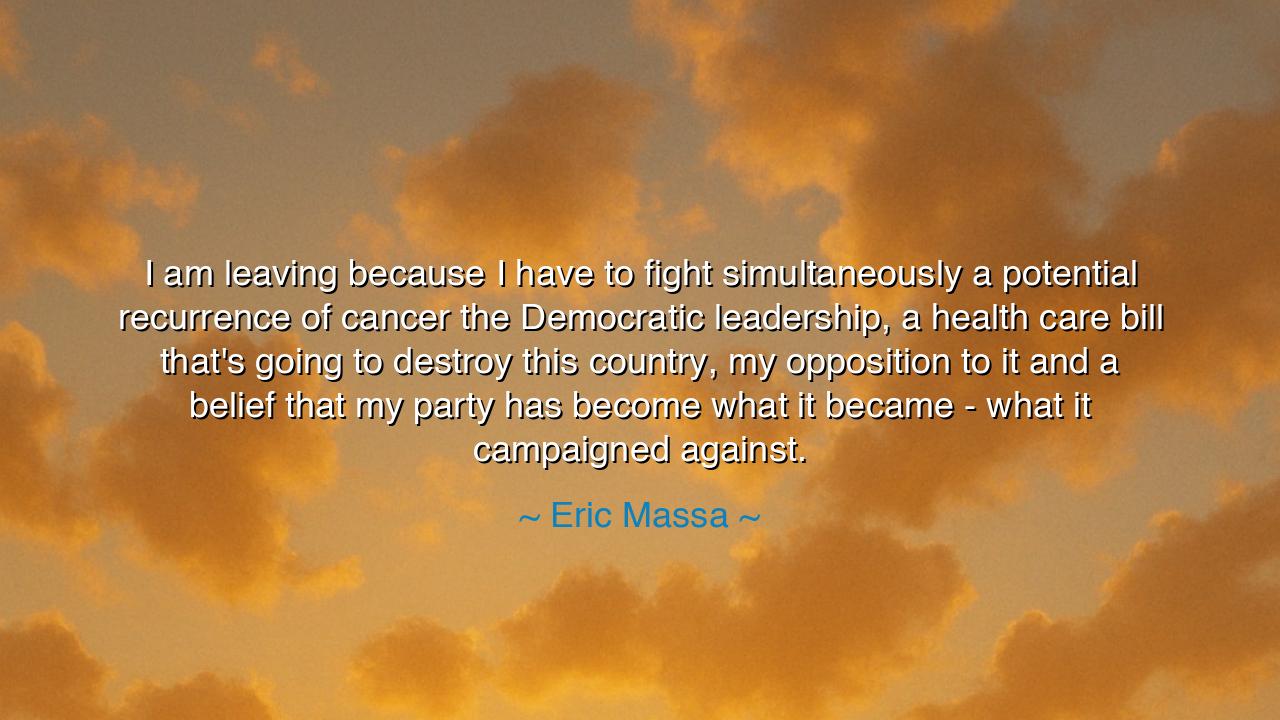
I am leaving because I have to fight simultaneously a potential
I am leaving because I have to fight simultaneously a potential recurrence of cancer the Democratic leadership, a health care bill that's going to destroy this country, my opposition to it and a belief that my party has become what it became - what it campaigned against.






The words of Eric Massa—“I am leaving because I have to fight simultaneously a potential recurrence of cancer, the Democratic leadership, a health care bill that's going to destroy this country, my opposition to it, and a belief that my party has become what it became—what it campaigned against”—resound with the anguish of a man torn between loyalty and truth, between duty to his fellows and duty to his conscience. They are the cry of one who stands at the crossroads of mortality and morality, struggling to keep his integrity unbroken amid the storms of power. Beneath these words lies the timeless drama of the soul who finds that the fight for honor often demands withdrawal rather than victory, and that sometimes the greatest act of courage is to step away from the corrupt chorus of politics and return to the purer battle within—the battle for life and truth itself.
Massa’s declaration is both personal and prophetic. When he speaks of “fighting simultaneously”, he lays bare the unbearable weight of the human condition—the way crises of the body, of principle, and of nation can converge upon one spirit. To fight cancer is already to wrestle with mortality; to battle one’s own political party is to face exile from belonging; to resist a law one deems unjust is to risk being misunderstood by all. His words evoke the image of a man surrounded by fires on every side, forced to choose which flames to face and which to flee. It is a moment as old as civilization itself—the moment when one must choose truth over comfort, conviction over convenience.
The heart of his lament lies in his belief that his party, the Democratic leadership, had become “what it campaigned against.” This is not merely a political accusation—it is a moral one. He saw hypocrisy where there once was hope, ambition where there once was principle. It is the ancient tragedy of governance: that those who rise to challenge corruption may, through time and power, become the very thing they once opposed. In this, Massa’s cry joins the voices of the ancients—from the Roman senator Cato, who denounced the moral decay of the republic, to the philosopher Diogenes, who wandered the streets with a lantern, searching in vain for an honest man. Such voices remind us that idealism, if not guarded by humility, can decay into the tyranny of self-righteousness.
To “fight cancer” in this context becomes more than a physical battle—it is a metaphor for purging the rot of falsehood wherever it lives. Cancer is the body’s rebellion against its own harmony, the uncontrolled growth that destroys from within. In politics, too, such cancer takes root when power grows without conscience, when loyalty replaces wisdom, when the desire to win overwhelms the duty to serve. Massa’s decision to leave, then, was not retreat—it was moral surgery, a cutting away of himself from a system he believed diseased. His withdrawal was not cowardice, but cleansing; not surrender, but survival.
History is filled with figures who made similar stands. George Washington, after the Revolution, could have made himself king, yet he chose instead to relinquish power, teaching the world that leadership must be bound by restraint. Sir Thomas More, facing death under Henry VIII, refused to betray his conscience for political expedience. Like Massa, they understood that the measure of a person’s greatness is not how long they hold their position, but how fiercely they hold to principle when the position itself demands betrayal. To walk away from corruption is, in truth, a form of heroism as noble as to fight it from within.
Massa’s quote also carries the weary tone of a man disillusioned with the machinery of democracy—the endless calculations, the shifting allegiances, the erosion of sincerity. Yet this disillusionment, painful as it is, bears wisdom. For it reminds us that all institutions—political, religious, or social—are merely reflections of the people within them. If they decay, it is because we have neglected the virtues that sustain them. The true reformer, then, must begin not by condemning the system, but by purifying the self. Only those who conquer the corruption within can hope to challenge the corruption without.
The lesson that emerges from his lament is both sobering and luminous: every age demands individuals who are willing to lose comfort for conscience. Power, whether in politics or life, is a test of integrity; it reveals whether a man seeks service or self-preservation. To “leave” as Massa did may look like defeat, but it is, in truth, the triumph of authenticity over illusion. The body may weaken, parties may fall, and causes may falter, but the soul that refuses to lie to itself remains unconquered.
Thus, let his words be carried forward as a warning and an exhortation. Beware the ease with which conviction turns to compromise. Beware the moment when ideals become slogans, and service becomes theater. And when faced with the choice between corruption and solitude, choose solitude—for though the lonely path is harder, it is the one where truth walks beside you. In every age, the world needs such men and women, who, like Eric Massa, will stand amidst the noise and dare to say, “I will not become what I once opposed.” For in that refusal lies the seed of renewal—the rebirth of integrity, the eternal heartbeat of democracy, and the undying hope that truth, though abandoned, will one day lead again.






AAdministratorAdministrator
Welcome, honored guests. Please leave a comment, we will respond soon